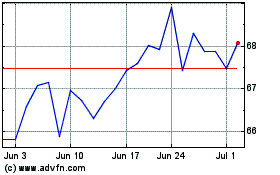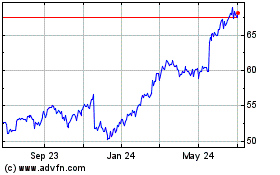Wal-Mart, Rakuten Take On Amazon -- WSJ
January 26 2018 - 3:02AM
Dow Jones News
By Sarah Nassauer and Mayumi Negishi
This article is being republished as part of our daily
reproduction of WSJ.com articles that also appeared in the U.S.
print edition of The Wall Street Journal (January 26, 2018).
Wal-Mart Stores Inc. is joining with Japan's largest online
retailer, Rakuten Inc., to bolster its efforts to compete with
Amazon.com Inc. in Asia and the U.S.
The two companies said Thursday they would form a joint venture
to sell online groceries in Japan and work together to sell e-books
and audiobooks in the U.S.
Wal-Mart's local retail brand, Seiyu GK, will join with Rakuten
to expand its online grocery-delivery service in the second half of
this year. The partnership will include opening a combined
e-commerce fulfillment center in the Tokyo area to deliver
groceries to a wider area.
The partnership could boost Wal-Mart's position in a promising
business where Amazon isn't yet strong. Japanese spent about $19
billion on food deliveries in the year ended March 2017, including
orders made in person, over the phone or online, according to Yano
Research Institute. That number is growing as more women work and
the elderly population rises. Rakuten shares jumped during Tokyo
trading Friday when the deal was announced and closed 4.5%
higher.
But Wal-Mart faces plenty of other competitors in food delivery,
such as stores owned by Seven & I Holdings Co., the Tokyo-based
parent of the 7-Eleven convenience-store chain. Food cooperatives
and smaller ventures that target niche markets, such as organic
vegetables, are also vying for customers. Wal-Mart and Rakuten said
they would offer meal kits, a product already sold by many of their
rivals.
In the U.S., Wal-Mart will work with Rakuten's Canadian unit,
Rakuten Kobo, to offer for the first time e-books and audiobooks in
the U.S., as the company tries to make walmart.com, a destination
for a wider variety of purchases and activities.
The deal "enables us to quickly and efficiently launch a full
eBook and audiobook catalog on Walmart.com," Scott Hilton, chief
revenue officer for Wal-Mart's U.S. e-commerce unit, wrote in a
blog post Thursday. The digital books could also be offered in
stores.
Amazon, which started as an online bookseller and has grown
rapidly into other categories, dominates the U.S. market for
e-books and has sold millions of its Kindle e-readers. Kobo sells
its own e-reader device, which Wal-Mart will now carry.
Wal-Mart has expanded its U.S. e-commerce sales in recent
quarters after rolling out online grocery services and buying a
string of online startups, including Jet.com Inc. in 2016, placing
the site's founder Marc Lore at the head of U.S. e-commerce
operations.
In Japan, both Rakuten and Wal-Mart are struggling to keep
Amazon at bay. In 2016, Japan was the second-largest market outside
the U.S. for Amazon, following Germany, with sales of $10.8
billion.
Wal-Mart has moved away from building its own stand-alone
e-commerce sites and infrastructure internationally. Two years ago,
Wal-Mart sold its Chinese e-commerce business Yihaodian to JD.com
Inc. and holds a roughly 10% stake in China's second-largest
e-commerce company after Alibaba Group Holding Ltd.
Wal-Mart and Rakuten declined to disclose the financial terms of
the deal. Under pressure from Amazon, Rakuten's e-commerce profits
are stalling despite growing revenue, prompting it to search for
new businesses.
Last month, Rakuten said it was applying for spectrum to become
Japan's fourth major cellphone carrier. Overseas, it has bought
messaging app Viber and invested in ride-hailing service Lyft
Inc.
Write to Sarah Nassauer at sarah.nassauer@wsj.com and Mayumi
Negishi at mayumi.negishi@wsj.com
(END) Dow Jones Newswires
January 26, 2018 02:47 ET (07:47 GMT)
Copyright (c) 2018 Dow Jones & Company, Inc.
Walmart (NYSE:WMT)
Historical Stock Chart
From Mar 2024 to Apr 2024

Walmart (NYSE:WMT)
Historical Stock Chart
From Apr 2023 to Apr 2024
